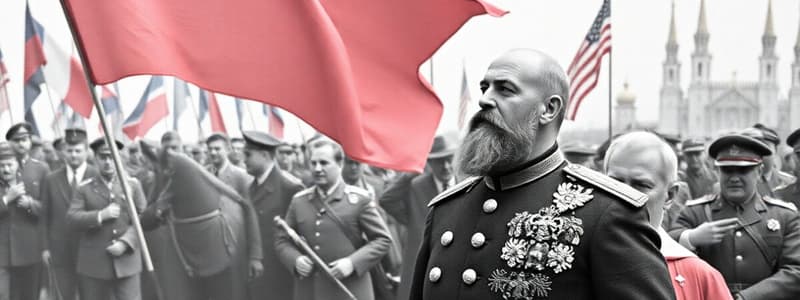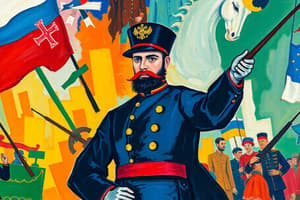Podcast
Questions and Answers
How did the Tsar's reluctance to share power contribute to pre-1914 tensions?
How did the Tsar's reluctance to share power contribute to pre-1914 tensions?
His unwillingness to abandon autocracy and make concessions to representative government fueled discontent.
What role did the growing professional middle class play in pre-1914 Russia?
What role did the growing professional middle class play in pre-1914 Russia?
They wanted a greater role in national government.
What was Nicholas II's major mistake in September 1915, and what was the consequence?
What was Nicholas II's major mistake in September 1915, and what was the consequence?
He took personal control of the army and was blamed for defeats.
Besides military defeats, how did Tsarina and Rasputin damage the Tsar's credibility during the war?
Besides military defeats, how did Tsarina and Rasputin damage the Tsar's credibility during the war?
Describe the economic impact of the war on urban areas in Russia.
Describe the economic impact of the war on urban areas in Russia.
How did the war specifically affect the peasant class?
How did the war specifically affect the peasant class?
By the end of 1916, what action did the generals take regarding their support for the Tsar?
By the end of 1916, what action did the generals take regarding their support for the Tsar?
Briefly describe the state of the political system in Russia before 1914.
Briefly describe the state of the political system in Russia before 1914.
How did defeats in the war impact the morale of the Russian army?
How did defeats in the war impact the morale of the Russian army?
Explain how the Tsar's personal involvement in the war effort backfired.
Explain how the Tsar's personal involvement in the war effort backfired.
How did the impact of WWI exacerbate pre-existing issues within Russia, according to the provided text?
How did the impact of WWI exacerbate pre-existing issues within Russia, according to the provided text?
What does the text suggest about the relationship between the Tsar and representative government before 1914?
What does the text suggest about the relationship between the Tsar and representative government before 1914?
Describe one way the war disproportionately affected the peasant class.
Describe one way the war disproportionately affected the peasant class.
How did the actions of Tsarina and Rasputin contribute to the downfall of the Tsar?
How did the actions of Tsarina and Rasputin contribute to the downfall of the Tsar?
What was a key demand of the growing professional middle class before 1914?
What was a key demand of the growing professional middle class before 1914?
Explain how the loss of animals impacted peasants already struggling with poverty during the war.
Explain how the loss of animals impacted peasants already struggling with poverty during the war.
How did the generals' loss of support for the Tsar signify a major shift in power dynamics?
How did the generals' loss of support for the Tsar signify a major shift in power dynamics?
What impact did the pre-1914 political system have on the population's perception of the government?
What impact did the pre-1914 political system have on the population's perception of the government?
How did the economic hardships brought on by the war affect the urban population?
How did the economic hardships brought on by the war affect the urban population?
What was the state of the Russian army's morale as the war continued?
What was the state of the Russian army's morale as the war continued?
Before 1914, what was the main issue for the peasants?
Before 1914, what was the main issue for the peasants?
How did the Tsar's personality traits contribute to the rising tensions before 1914?
How did the Tsar's personality traits contribute to the rising tensions before 1914?
Give an example of how WWI directly impacted food source among peasants.
Give an example of how WWI directly impacted food source among peasants.
How unsustainable was running the country by Tsarina and Rasputin?
How unsustainable was running the country by Tsarina and Rasputin?
How did the growing middle class view corruption?
How did the growing middle class view corruption?
How did the urban workers express their dissatisfaction contributing to the revolution?
How did the urban workers express their dissatisfaction contributing to the revolution?
What did the landless laborers want?
What did the landless laborers want?
How did continuous defeats impact the soldiers' willingness to participate in the war?
How did continuous defeats impact the soldiers' willingness to participate in the war?
What was the significance of the generals withdrawing support from the Tsar?
What was the significance of the generals withdrawing support from the Tsar?
What revolution was caused by the combination of the factors listed?
What revolution was caused by the combination of the factors listed?
Flashcards
Tsar's Leadership Before 1914
Tsar's Leadership Before 1914
Indecisive, weak, and unwilling to abandon autocracy, and unprepared to make concessions to representative government.
Political System Before 1914
Political System Before 1914
A political system largely based on autocracy, characterized by repression, corruption, and being outdated.
Impact of War - Army Morale
Impact of War - Army Morale
The soldiers reluctance to fight as defeats decrease the army moral.
Tsar's control of the army
Tsar's control of the army
Signup and view all the flashcards
Middle class view on government
Middle class view on government
Signup and view all the flashcards
Economic Impact of War
Economic Impact of War
Signup and view all the flashcards
Impact of war on peasants
Impact of war on peasants
Signup and view all the flashcards
Erosion of Tsar's support
Erosion of Tsar's support
Signup and view all the flashcards
Middle class before 1914
Middle class before 1914
Signup and view all the flashcards
Urban workers before 1914
Urban workers before 1914
Signup and view all the flashcards
Peasants before 1914
Peasants before 1914
Signup and view all the flashcards
Study Notes
Contributory Factors Before 1914
- The Tsar was indecisive, weak, and unwilling to abandon autocracy.
- The Tsar was unprepared to make concessions to representative government.
- The political system was largely an autocracy, repressive, often corrupt and outdated.
- There was a growing professional middle class that wanted a greater role in national government.
- Urban workers were alienated and disaffected, with increasing strikes.
- Peasants were mainly poor and hungry for more land, leading to a developing class of hostile landless laborers.
Impact of War
- Defeats negatively affected army morale, leading to soldiers becoming increasingly reluctant to fight.
- The Tsar's decision to take control of the army in September 1915 was a major mistake and he was personally blamed for defeats.
- Disastrous efforts to run the country by Tsarina and Rasputin further damaged the Tsar's credibility.
- The middle class considered the government incompetent and desired a more representative government.
- The war had a devastating economic impact on the cities, leading to inflation, unemployment, and shortages of food, fuel, raw materials, etc.
- Peasants were negatively impacted by the loss of sons in the war and the loss of animals to the army, causing food production to fall.
Support for the Tsar
- Support for the Tsar was rapidly eroding at all levels by the end of 1916.
- The generals informed the Tsar that they would no longer support him.
February Revolution
Studying That Suits You
Use AI to generate personalized quizzes and flashcards to suit your learning preferences.




